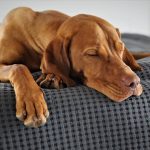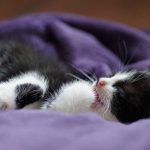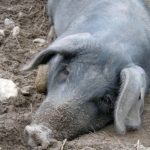Quick Navigation
Is your dog drooling while sleeping?
Drooling is typical for all canines.
It’s a natural, healthy bodily function that helps dogs to eat and digest food.
However, if your dog drools excessively while asleep or awake, it can be a sign of a severe problem.

In this blog post, we list down the causes of why your dog is drooling while sleeping.
While some reasons are natural, others may be due to underlying issues.
Continue reading to find out.
Why Is My Dog Drooling While Sleeping?
1. Type Of Dog Breed
Drooling is usual in particular dog breeds, such as the Mastiff, Bloodhound, Newfoundlands, and Saint Bernard.
These dog breeds normally slobber because their head or lip conformations cannot keep the amount of drool they produce.
This results in slobbering.
Besides, these dog breeds also have extra skin around their muzzle and lips, which enables saliva to gather in the folds.
Therefore the saliva flows from their flews or loose upper lips when these dogs sleep.
If you have such a dog breed at home, you should place a towel on the head of the dog as it sleeps to keep you from cleaning up the drool from time to time.
2. Night Dreams
Just like humans, dogs also have dreams of their own while sleeping.
Therefore, if your dog doesn’t drool while sleeping, it may be because it has a sweet dream.
On the other hand, your dog drools while sleeping because it is eating juicy bones or food in its dreams.
Nonetheless, if the problem recurs daily, then your dog may be going through a different issue.
3. Foreign Objects
Another common reason why dogs drool while asleep or awake is due to foreign objects inside their mouths.
If this is the case, inspect your dog’s teeth, tongue, and gums for any lodged particles.
If you come across objects in your dog’s mouth, such as shards of bones, plants, splinters, cloth, or hooks, you should remove them.
Additionally, brush your dog’s teeth more often to maintain good oral hygiene.
If any object is stuck in your dog’s mouth, don’t forcefully remove it; instead, visit a veterinarian.
4. Mouth & Throat Problems
Visiting the vet once in a while is essential to detect and treat some issues early.
For instance, if your dog has a fractured tooth or tumor in the mouth, throat, or esophagus, swallowing will be a problem.
As a result, it can cause your dog to drool due to saliva build-up.
Keep a keen eye on your dog’s dental formula to avoid such problems.
Always check if there is a brown or yellow plaque in the dog’s mouth.
Also, red and inflamed gums mean your dog needs some good teeth cleaning.
5. Stomach Problems
If your dog ingests undesirable or certain foods accidentally, this may cause drooling.
Apart from that, the dog may also have stomach problems.
Therefore, if you suspect your dog is slobbering because of ingesting an undesirable object, you should visit a vet immediately.
Toxic substances can cause drooling.
Some plants are poisonous to your pet when ingested.
So, if your dog consumes them, they may end up drooling even when asleep.
6. Heatstroke
Many dogs drool during summer because of high temperatures and even at night.
If your dog usually drools excessively during the summer, you should have nothing to worry about.
It’s also important to note that some dog breeds are more vulnerable to heatstroke than others.
Such dog breeds include bulldogs, pugs, boxers, and Boston terriers.
7. Poisonous Plants & Animals
As stated earlier, your dog might ingest some plants and animals that will cause them to drool.
Plants like Azaleas, Tulips, and Chrysanthemums can make your dog drool and even ill.
Ensure your dog doesn’t feed on these plants or animals to keep it from drooling excessively.
8. Underlying Conditions
Apart from natural drooling, your dog may drool while sleeping because it has a particular underlying health problem.
It can be an organ disease such as a kidney or liver problem or a respiratory infection.
As dog ages, they are more likely to fall sick.
With that in mind, you need to take them for a checkup at least twice a year.
Respiratory infections that can cause drooling are the nose, sinuses, or throat infections.
Liver and kidney diseases can cause hypersalivation, leading to excessive drooling.
Always have your vet check your dog if you suspect it’s drooling caused by an underlying issue.
Possible Treatments For Unusual Drooling
If you notice that your dog is drooling and it’s unusual for your dog to do so, you should take quick action.
But first, you need to find out why it’s drooling.
As we stated earlier, some dogs may drool naturally, while others may be due to underlying issues.
Take your dog to the vet right when it starts to drool excessively.
But before that, you should make your dog comfortable and give it enough water.
Afterward, you can take it to a veterinarian for a checkup and treatment.
Stop guessing or assuming your dog will be fine when it drools unusually.
For instance, diseases like cancer and rabies can have a lasting impact on your dog if left untreated in its early stages.
So, take quick action and save your furry friend.
Summary
Drooling is typical for certain dog breeds.
Dogs also drool when they contact certain plants and animals.
However, excessive or unusual drooling while your dog is asleep may mean something else.
Thus, if your dog is drooling unusually while asleep, you should give it enough water and visit the veterinarian immediately.
Your dog may be having an underlying issue that may cause more significant problems in the long run.
Let the vet diagnose your dog so you can have peace of mind.
We hope this article has enlightened you and helped you take the necessary action toward your drooling dog!
Of course, if it’s natural, you have nothing to worry about.

Purrfect n’ Pawesome is the brainchild of Amanda, who has been into researching and writing about pets to help other pet parents in nurturing their adorable pets. Currently, she runs Purrfect n’ Pawesome along with her team of experienced and dedicated pet experts. Along with being an awesome writer and entrepreneur, Amanda is a cat mom to two innocently spoiled cats, Balanca and Scruffy.
She has been writing about pet care and nurturing and wants to share her readers’ experiences, learnings, and knowledge.
Over the years, she had the opportunity to work with various pet owners having multiple breeds, and that exposure gave her experience and the lessons of a lifetime.
Her family, her entire universe revolves around her two cats, who give her endless support and inspiration to move ahead with her objectives in life. Amanda is a live example of a balanced approach to all parenthood questions we all face in life.






